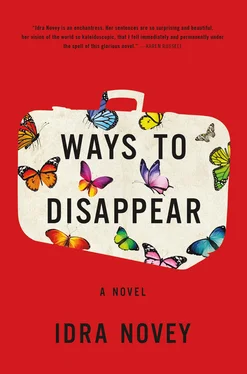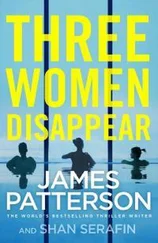This morning, however, she was still confined to this situation and to the sound of Miles shouting outside the bathroom. Even with the fan on, she could hear him saying something about a fire. At the word dead, she couldn’t help but pause and put down her hairbrush, placing it next to the soap.
She heard him say burned.
She heard obliterated.
Room down around her.
She heard gone. In the hotel lobby on the TV.
Heard enough that she emerged from the bathroom to find the door of the room ajar and the TV on. On the screen a smoky hole was smoldering where a building had been. Tourists and islanders were crowding together in front of it, coughing in the smoke. A helicopter landed as a message in bold white letters scrolled across the bottom of the TV screen: MISSING WRITER BEATRIZ YAGODA FOUND DEAD IN FIRE ON THE ISLAND OF BOIPEBA.
The message scrolled across a second time, a third, and Emma kept on reading, translating it over and over in her head. She was still fixated on the words replaying at the bottom of the screen when she heard Miles speaking to someone just outside the door.
Emma, can you tell this man he’s got the wrong room?
At the sound of her name, Emma finally turned from the news and saw Marcus standing transfixed in the open doorway, watching the TV. She registered what was happening but so had Miles, who seized Marcus’s T-shirt with both fists and began to shake him so hard Marcus shouted in pain and tried to cover the bandaged side of his head. Emma yelled at Miles to stop and lunged to pull him off, the news playing on behind them, seeming to get louder, devouring the room and then the hallway as Marcus twisted free, and Emma ran after him, apologizing, and he said, Please. My mother is dead. Please leave me alone.
Whether you’re listening or not, my friends, whether a beautiful sentence moves you or leaves you cold, Brazilian literature has lost a piece of its soul today. Beatriz Yagoda may have gambled too much and hid from her own children, but she wrote like the room was on fire, and so it went down. At nine this morning she burned to death in a hotel on Boipeba. The flames, my friends, were started by a cigar left burning in her room. Smokers, take heed.

Emma kept to her hotel room in case Marcus called her back. She’d left him message after message until his voice mail was full. Raquel had called once with the details of the funeral but that was all.
Miles had finally flown back to Pittsburgh.
Her author was gone.
Besides the occasional shout on the street or a few fleeting samba notes from a passing car, nothing broke the impersonal quiet of her hotel room. As the long minutes of the humid afternoon turned into the even longer minutes of evening, she got increasingly restless. She looked up flights online but bought none of them. She went out for food, returned, and still the hours until the funeral dripped by like a leak from a faucet.
It was dark by the time she began flipping through her notebook, trying to make out what she had intended in the sentences she’d scratched out and scribbled again. After all that had happened in the past two days, much of her own handwriting had become mysterious to her.
With her translations, she’d learned to type for long stretches without ever looking at the screen. She’d keep her face turned to Beatriz’s book, propped open beside her on the desk, or she’d stare out the window and trust her fingers to key in the words as they occurred to her. When she looked back over what she’d typed, there was a kind of magic in seeing that her hands had indeed accurately translated what had come into her mind into sentences on the screen. There was no reason to believe that her fingers wouldn’t comply with a similar kind of magic if the words she was typing up happened to be her own.
And if her fingers failed to comply, if what she wrote wasn’t worth typing up, who would ever know? She was alone with all the hours of her life.
Transcribe:From the Latin prefix trans + scribere. 1.To write something anew and fully, as with a score of music for a new instrument. 2. To convert a written work in such a way that it alters the expectations of others and/or oneself, often requiring the abandonment of such expectations entirely. See also:transform, transgress, translate.

Rocha arranged the reception, a private one, to follow the larger gathering the Ministry of Culture had put together for the public in the Biblioteca Nacional. For the literati, Rocha ordered a full spread from Antiquarius and spoke with the chef directly to ensure that everything would be impeccable, the best trays of meats and fruits, the most expertly prepared cuts of sashimi, a few salads. He chose the flowers himself, small-mouthed vases of cream-colored lilies, and made sure they were arranged with subtlety, not just shoved in with some ferns and other filler.
Every night before the funeral he had woken up and seen the ashes playing across the ceiling above his bed and across the walls, on the mirror in the bathroom. Beyond the phone calls for the funeral preparations, he had barely spoken. A man who knows how to be silent, Beatriz wrote in her third novel, is a man who knows how to begin.
But begin what? For whom?

If João had smelled the fire sooner.
If he had stepped out earlier, seen the smoke blowing over the bougainvillea.
If the hose in the garden had been longer.
If the island had owned a proper fire truck, if Mario had bought an extinguisher, if anyone had had the special fire clothes and mask that made it possible to go in and pull a person out of a flaming room.
If they hadn’t used so much bamboo for the chairs and also the dressers.
If they had considered how quickly bamboo lit and could fill up a room with smoke.

If she had stayed longer.
If she had insisted her mother also board the boat.
If she had forced her.
If she had been more forgiving.
If the motor had sputtered.
If she hadn’t stared so long at that awful coat.
If she had opened her eyes in the dark and gazed back at her mother.
If she’d admitted how good it felt to lie there and feel her mother present, watching.
If there had been anything left of her mother after the fire.
If the firemen had found even some vestige of her teeth.
If Raquel had turned around and waved again, harder.
If she had called out as the boat drew away, had left her mother curious about what it was she’d shouted from the water.
If the waves had been so strong that they couldn’t leave.
If the whale.
If the boat.
If the rain.

If we honor what we can recall by accepting that we cannot change it, the rabbi was saying. Or he was making more sense than that but Emma couldn’t follow. Her mind felt blanched and she was uneasy. She kept feeling someone watching her and with an unsettling intensity, the way Beatriz had watched her if Emma was walking toward her from the other side of a room.
But that couldn’t be. Her author was dead, ashes. Someone at the funeral just happened to study people with a similarly electric gaze. Emma looked around to see who that person could be, but all the heads around her seemed to be lowered for the Kaddish.
Читать дальше













